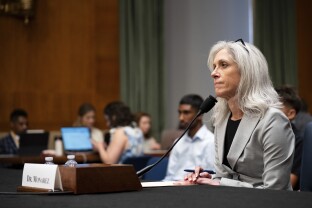The longtime public health official nominated to lead the Centers for Disease Control and Prevention stuck to the MAHA party line during her confirmation hearing on Wednesday, but without outright endorsing some of Health Secretary Robert F. Kennedy Jr.’s more controversial decisions.
In an appearance before the Senate committee on Health, Education, Labor and Pensions, nominee Susan Monarez evaded multiple attempts by Democratic committee members to elicit criticism from her of the secretary.
“The secretary is doing important work of leading a complex agency through a number of different transitions,” Monarez replied when asked by Sen. Patty Murray if she disagreed with any of Kennedy’s decisions so far.
Monarez, a career federal employee who has a Ph.D. in infectious disease research, is generally considered by public health experts to be a safe and competent choice for CDC director and has been serving as acting director since January. She has worked within the federal government since 2006, including within the Obama White House, and was most recently deputy director of the Advanced Research Projects Agency for Health, a small agency within the Department of Health and Human Services.
But as Monarez faces Senate confirmation — something required for CDC directors for the first time this year — she is facing intense scrutiny over not her own record, but Kennedy’s.
At times, Monarez appeared to avoid saying she absolutely agreed with some of Kennedy’s choices.
Several senators pressed Monarez on the changes Kennedy made to the CDC’s Advisory Committee on Immunization Practices. Kennedy dismissed all 17 members of the committee and has so far appointed eight new members, several of whom have been critical of vaccines. ACIP makes recommendations on which vaccines are included in the national schedules for adults and children. The eight new members of the committee are meeting this week.
Sen. Tammy Baldwin criticized the new appointees to the ACIP as not having gone through an ethics review process (former committee members have said it has historically taken up to two years to vet new members of the committee) and asked Monarez if recommendations of unvetted committee members should be considered valid.
“If they have not gone through an ethics approval process, they shouldn’t be participating,” Monarez responded.
Monarez was also subjected to questioning about cuts made to CDC staffing and programs so far — and who has been making those decisions. The lack of a clear leader at the CDC has drawn concern.
For the most part, Monarez said she was not familiar with specific staffing changes made at the CDC while she was acting director.
“I was not involved in that decision-making,” Monarez told Sen. Andy Kim when asked about staffing cuts to the World Trade Center Health Program.
Committee Chair Bill Cassidy, who remains skeptical of Kennedy though he ultimately voted for his confirmation, used his time to ask Monarez about her views on vaccines and whether she would support the development of mRNA vaccines specifically.
Monarez responded that the Food and Drug Administration has approved the COVID-19 mRNA vaccines and deemed them safe.
“I have no a priori prejudices against the mRNA platform or any other approach that is being taken to develop vaccines. That is why we have the safety and efficacy standards that the FDA puts in place.”
Cassidy told Monarez, “I think we are united. We want President Trump’s initiative to make America healthier again to succeed and emphasize rebuilding trust.”
“If the ACIP hearing today is being used to sow distrust, I would ask as you go forward that you would make sure that there really was a balanced perspective,” Cassidy told Monarez, to which she responded, “Absolutely.”
—
Margaret Manto is a NOTUS reporter and an Allbritton Journalism Institute fellow.
Sign in
Log into your free account with your email. Don’t have one?
Check your email for a one-time code.
We sent a 4-digit code to . Enter the pin to confirm your account.
New code will be available in 1:00
Let’s try this again.
We encountered an error with the passcode sent to . Please reenter your email.


